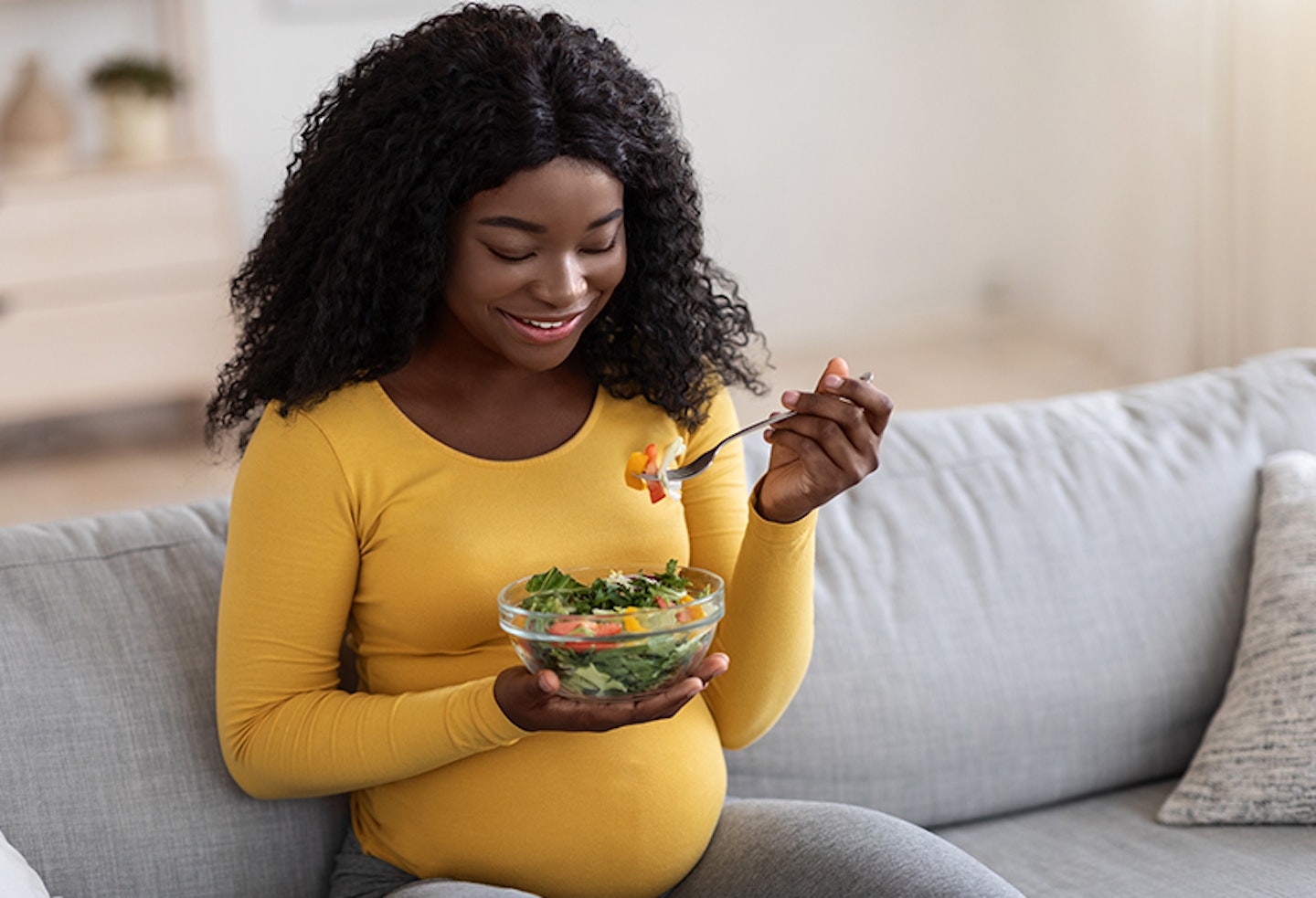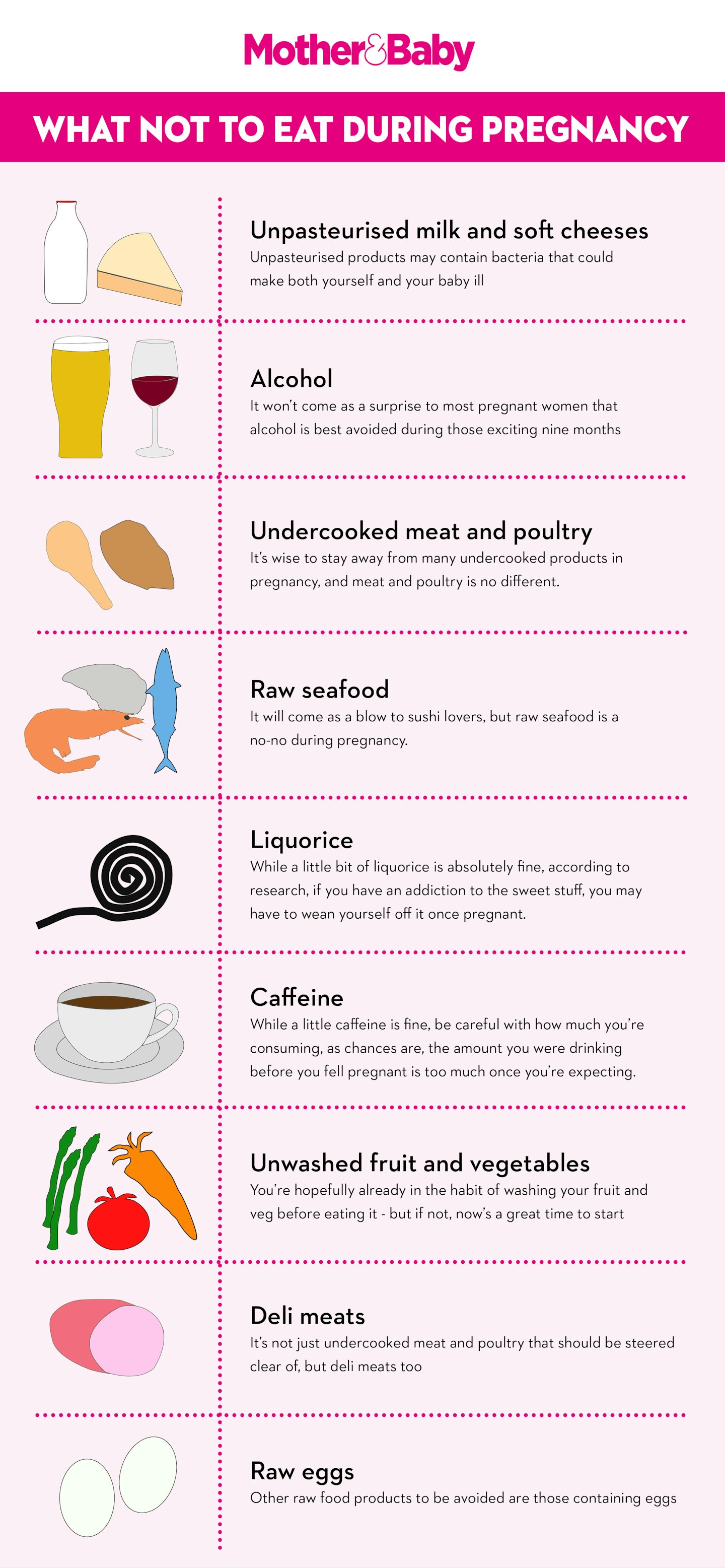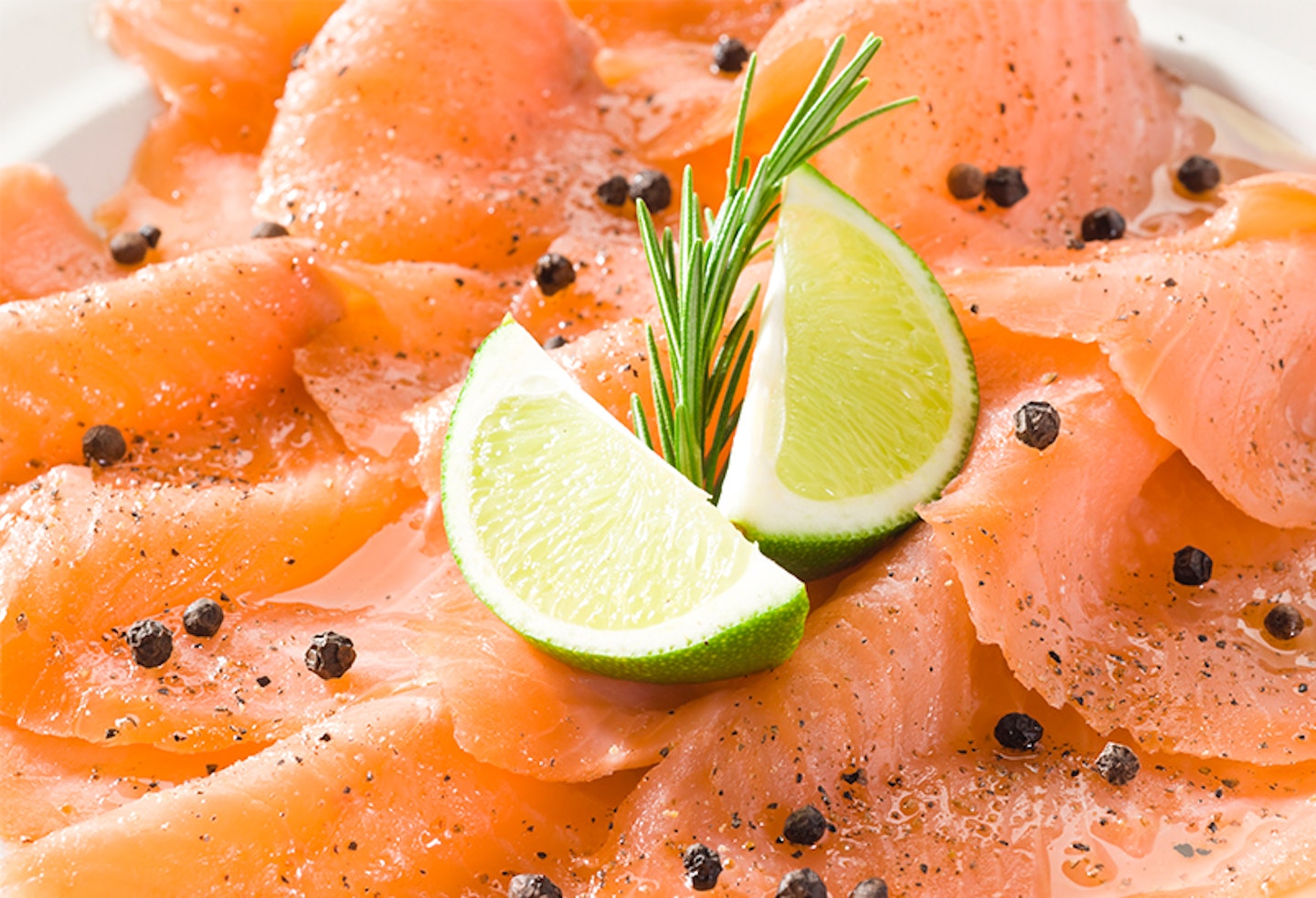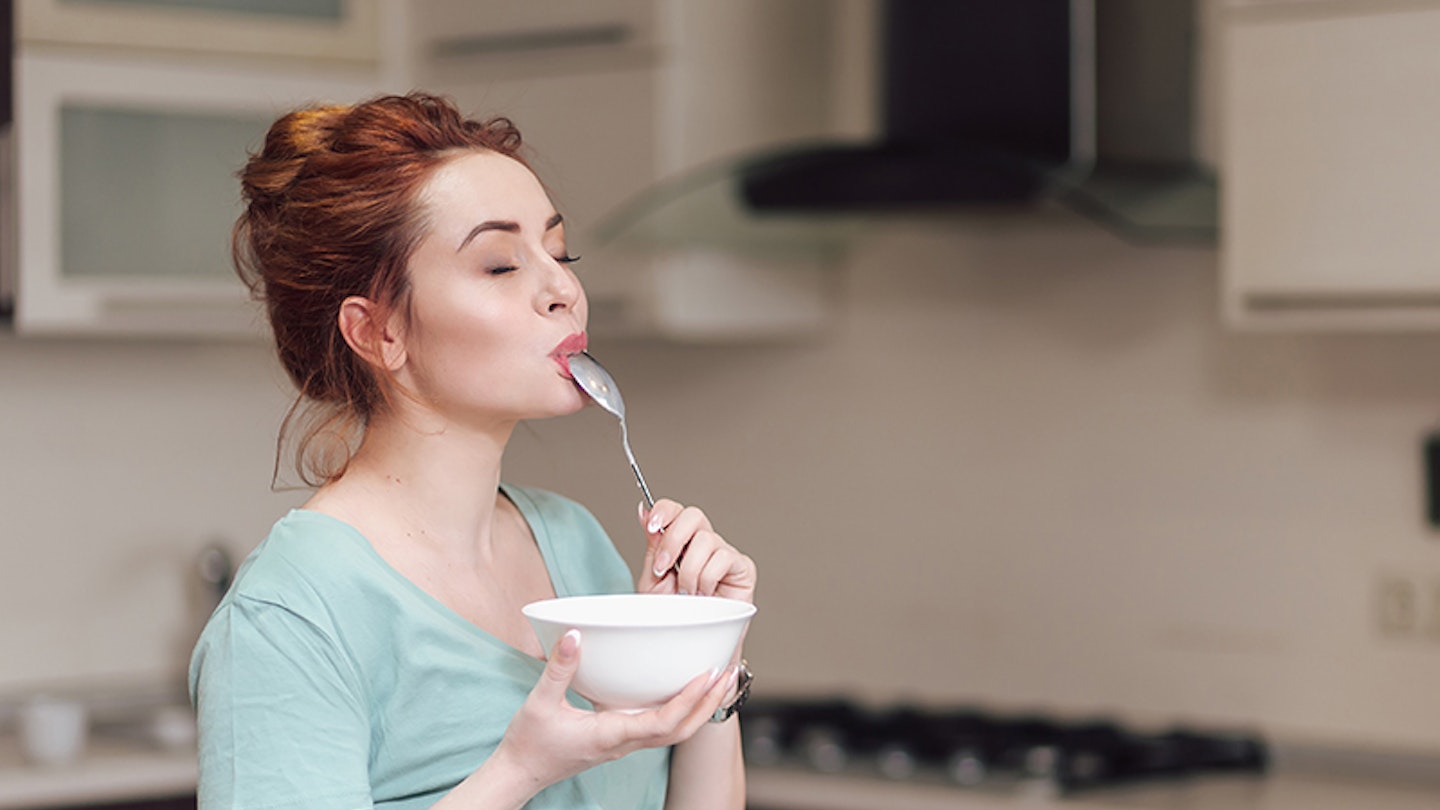Eat, restrict or avoid? There’s no bigger motherhood minefield than trying to distinguish which foods should be completely cut from your diet during pregnancy and which are OK in moderation. With so much information available and the guidelines changing between generations, it's difficult to know which foods you should and shouldn’t be eating during pregnancy.
Keeping you and baby safe and healthy is the top priority, so you want to feel confident about what is and isn't safe to eat. We spoke to a range of nutrition and pregnancy experts to separate fact from fiction and confirm which foods you should steer clear from and why.
Why is diet important during pregnancy?
Registered Nutritional Therapist, Jen Walpole, gave us an insight into why nutrition is relevant to expectant mothers. She advised, “Understanding which foods are safe to eat and which should be avoided can help reduce the risk of infections and ensure proper nutrient intake.” This is particularly important because a balanced diet supports mum and baby’s development during pregnancy.
She explained that pregnancy lowers a mother’s immune system, making you more susceptible to infections. Listeria, Salmonella and E. Coli are examples of common foodborne bacteria that could make expectant mothers very sick. We can reduce the risk of exposure to bacteria by following food safety guidelines such as washing food before consumption, observing use-by dates and avoiding high-risk, raw or partially cooked foods.
Another reason to be aware of the advice surrounding diet in pregnancy is the impact that excessive consumption of some foods can have on fetal development. Mercury and Vitamin A are examples of essential nutrients, that when consumed excessively can have a negative impact on baby’s development.

Foods and drinks to avoid when pregnant
Alcohol
It won’t come as a surprise to most that alcohol is best avoided during pregnancy. Whilst the true effects of small amounts of alcohol during pregnancy are not widely researched, many studies show the negative impacts large amounts of alcohol have on an unborn baby.
Our experts recommended avoiding alcohol altogether. GP Dr Rupert Critchley adds that you should start thinking about cutting out alcohol even before trying for a baby. “The Chief Medical Officers for the UK recommend that if you're pregnant or planning to become pregnant, the safest approach is not to drink alcohol at all to keep risks to your baby to a minimum,” he says. “The more you drink, the greater the risk of long-term harm to the baby."
Undercooked or raw meat and fish
Jen advises, “Undercooked meat, shellfish, and cold-smoked fish (like smoked salmon) can harbour bacteria and parasites.” For these reasons it is best to avoid undercooked products during pregnancy.
“Salmonella poisoning is most likely to come from these products, so make sure all meat - especially poultry - is well cooked,” adds Nutritional Therapist Tracey Strudwick. “Take care when handling raw meat and store it separately in the fridge to avoid cross-contamination.”
Sushi lovers prepare to be disappointed, raw seafood should also be avoided during pregnancy. Tracey says, “Occasionally, raw fish such as salmon may contain small parasitic worms that can cause illness, and raw shellfish can contain harmful viruses and bacteria."
Deli meat
It’s not just undercooked meat and poultry that should be steered clear of, but deli meats too, according to Lily Soutter, a Registered Nutritionist at Nuffield Health. “Deli meats or any cold cuts which have been cooked prior to purchase should be avoided,” she says. “Listeria, a dangerous bacteria, can be present and can cause side effects for your developing baby. While cases are rare, to be on the safe side, I would either avoid them completely or heat your roast beef sandwich thoroughly in the microwave.”
Unpasteurised milk
Unpasteurised products may contain bacteria that could make both yourself and your baby ill, which is why they are best avoided when pregnant. Tracey suggests, "High levels of the bacteria Listeria Monocytogenes may be found in unpasteurised milk and cheese, and listeriosis, while rare in the UK, can cause miscarriage, stillbirth or severe illness in newborns,” Although this sounds scary, it is important to know that most cheese sold in UK supermarkets is pasteurised. You should also be careful of mould ripened cheese like blue cheese and camembert.
Foods to restrict during pregnancy
Caffeine
You may be happy to know you don’t have to give up caffeine entirely, particularly if you are busy running after other children, but you need to be careful with how much you are consuming. NHS guidelines recommend no more than 200mg caffeine per day, which is the equivalent of 2 cups of coffee or 1 stronger coffee shop coffee.
Laura Southern, nutritional therapist at London Gynaecology, adds, “Caffeine is found in tea (be it regular, green tea and chai), chocolate, cola drinks and energy drinks, so if these are still in the woman's diet during pregnancy then the amount consumed needs to be checked. Many of my pregnant clients (and myself included through my three pregnancies) completely go off the taste and smell of coffee in their first trimester, and this helps with avoidance.”
Dr Rupert points out that too much caffeine - even in drinks we may not expect to be laden with the addictive stuff - can harm the baby. "Try to avoid too much coffee and tea,” he says. “High caffeine intake can lead to low baby weight and even miscarriage. Furthermore, fizzy and sugary drinks can also contain caffeine and can be packed full of chemicals and sweeteners, all of which are best avoided."
Fish
Although nutrient-dense and considered healthy during pregnancy, certain types of fish should be restricted due to the large amounts of mercury that could be present. Tracey explains, “Marlin, shark and swordfish may contain high levels of mercury, which can be harmful to the developing nervous system of the foetus,” she adds. “Mercury has concentrated up the food chain, so is found in the highest amounts in large, predatory fish such as these, as well as tuna, so it’s recommended that pregnant women don’t eat more than two portions of fresh tuna or four medium-sized tins per week.”
What not to eat during pregnancy chart

Experts answer your pregnancy food questions
Got a question about what you can and can't eat during pregnancy? Don't worry. Our experts have got you covered.
Can you eat eggs when pregnant?
You can tuck into raw, partially cooked and fully cooked British Lion eggs (eggs with a lion stamp on them) because they are less likely to have salmonella in them. This is because the hens laying them have been vaccinated against salmonella. You can also have eggs that are not British Lion, as long as the whites and yolks are cooked thoroughly until solid.
You should avoid raw or partially cooked eggs that are not British Lion as well as duck, goose or quail eggs, unless cooked thoroughly until the whites and yolks are solid.
Can you eat liquorice when pregnant?
While a little bit of liquorice is absolutely fine, according to research, if you have an addiction to the sweet stuff, you may have to wean yourself off it once pregnant.
“Recent research carried out by the University of Helsinki concluded that women should avoid consuming large amounts of liquorice during pregnancy after studying the effects on 400 young adolescents,” says Lily. “The findings showed evidence that youths who were exposed to large amounts of liquorice while in the womb performed less well than others in cognitive reasoning tests.”
However, if you love the sweet treat, don’t despair: “The researchers, however, stressed that occasional consumption of liquorice during pregnancy is not dangerous, and there are no current UK guidelines which suggest pregnant women should avoid liquorice,” Lily adds.
Can you eat cheesecake when pregnant?
Cheesecakes can contain raw or partially cooked eggs, unpasteurised cream cheese or toppings made from unpasteurised cream or milk. For this reason they are only ok for you enjoy if they have been baked, which means that the temperature of the oven will kill any salmonella that may be present, lowering the the risk to you.
Unbaked cheesecakes that contain raw or partially cooked eggs or unpasteurised cream cheese or toppings made from unpasteurised cream or milk are a no-no.
Are nuts safe to eat during pregnancy?
You might be confused when it comes to nuts, but according to the NHS guidelines, you can eat peanuts or food containing peanuts, such as peanut butter during pregnancy, unless you’re allergic to them. The government previously advised women to avoid nuts during pregnancy, but recent research has shown no reason why they should be avoided.
Is mozzarella safe to eat during pregnancy?
So long as mozzarella is made from pasteurised milk it’s fine to eat during pregnancy. You should avoid soft cheeses in pregnancy such as brie, Camembert, Roquefort and Gorgonzola.
Is lobster safe to eat during pregnancy?
According to NHS guidelines, lobster is safe to eat as long as it is cooked.
Can you eat smoked salmon when pregnant?
According to NHS guidelines, smoked fish, which includes smoked salmon and smoked trout, is safe to eat when you’re pregnant as long as it is cooked beforehand, but ready-to-eat cold-smoked or cured fish should be avoided.

Are prawns safe to eat during pregnancy?
Shellfish is safe as long as it is cooked, as raw shellfish contain harmful bacteria and viruses that can harm your baby. That said, if the prawns are cold but pre-cooked, they are also safe.
Can you eat mayo when pregnant?
While you should avoid homemade mayonnaise because it may contain undercooked or raw eggs, mayo that you buy from the supermarket such as Hellmann's is usually safe to eat during pregnancy as it's made with pasteurised eggs.
Are mushrooms safe to eat during pregnancy?
Although you should avoid eating raw mushrooms, when cooked, they are great to eat during pregnancy as they contain riboflavin, essential for your baby’s bone, muscle and nerve development.
Can you eat tuna when pregnant?
The NHS say that you should eat no more than 2 tuna steaks (about 140g cooked or 170g raw) or 4 medium-size cans of tuna (about 140g when drained) per week. This is because tuna has more mercury in it than other fish and if you eat too much mercury, it can be harmful to your baby.
Can I eat pineapple during pregnancy?
You may have heard rumors that eating pineapple can cause a miscarriage or bring on early labour, however, these stories are anecdotal as there is no scientific evidence to support this, so pineapple is safe to eat.
Meet the experts
Jen Walpole is a Registered Nutritional Therapist specialising in fertility and pregnancy. She is also a member of BANT (The British Association of Nutritional Therapists) and the CNHC (Complementary and Natural Health Care Council).
Dr Rupert Critchley qualified as a medical doctor in 2009 and is a fully qualified and practising General Practitioner. Since beginning his medical career, he quickly developed a passion and keen eye for aesthetics which led him to establish his own industry-leading practice, VIVA Skin Clinics.
Tracey Strudwick is a licensed Nutritional Therapist and a member of the British Association for Applied Nutrition and Nutritional Therapy (BANT), and a Yoga Alliance Certified Yoga Teacher.
Lily Soutter is a Registered Nutritionist in London. She trained at Newcastle University to obtain a BSc (hons) in Food and Human Nutrition (AfN accredited), and went on to graduate with an MSc in Nutritional Medicine (AfN accredited) with distinction from Surry University, as well as achieving a 2 year postgraduate diploma in nutritional therapy.
Laura Southern is a fully certified nutritional therapist, who has worked in nutritional therapy for 14 years, she qualified at the prestigious Institute for Optimum Nutrition, which is recognised as one of the leading centres for nutritional training and education.
Geraldine Bauer is a psychology graduate and registered nurse specialising in oncology and palliative care. She is a mum of two children (aged 5 and 2) and spends most of her time balancing her passions and enjoying time with her family.
